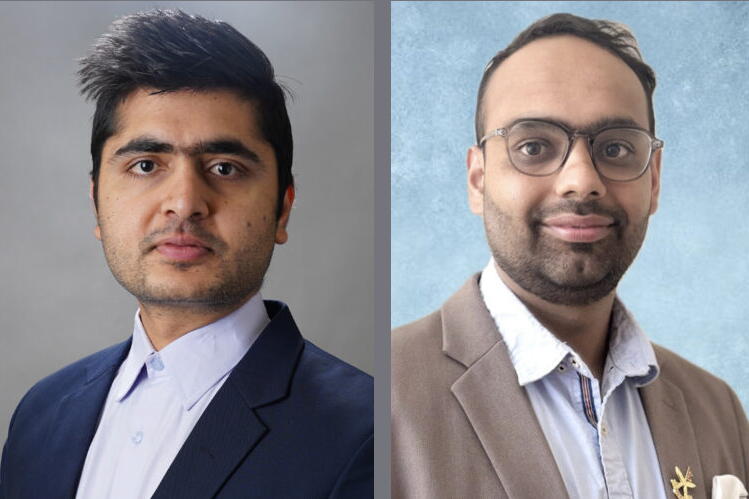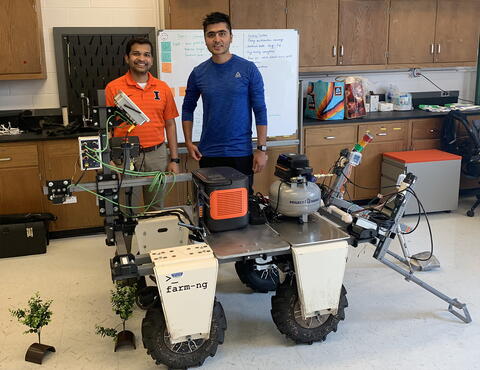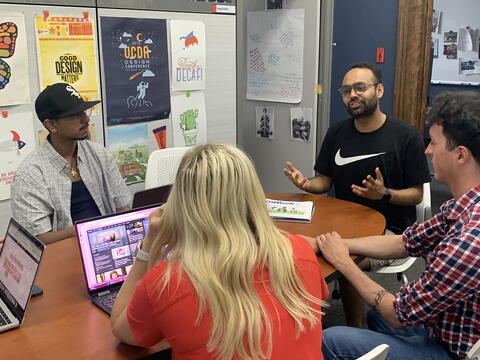Two ACES doctoral students receive prestigious FFAR fellowships

Sandesh Poudel and Abichal Poudel (no relation), doctoral students in the College of Agricultural, Consumer and Environmental Sciences at the University of Illinois Urbana-Champaign, have received 2025 Foundation for Food and Agriculture Research (FFAR) fellowships.
The FFAR Fellows Program provides professional development and career guidance to prepare the next generation of food and agriculture scientists for the workforce. North Carolina State University leads the initiative, which offers leadership training, networking opportunities, and peer support to doctoral students in the U.S. and Canada.
Sandesh Poudel, Agricultural and Biological Engineering
Sandesh Poudel is a doctoral student in the Department of Agricultural and Biological Engineering (ABE) in the College of ACES and The Grainger College of Engineering. His research focuses on developing a robotic system for removing weeds in horseradish, a specialty crop grown primarily in Illinois and Wisconsin. The project includes three components: autonomous navigation, weed detection, and weed removal using mechanical arms. Poudel has pilot tested the system in the lab, and this summer he will test it in a horseradish field in Collinsville, Illinois.
“The goal of this research is to reduce the use of chemical herbicides, minimize the burden of human labor, and provide a sustainable and cost-effective alternative for weed control. The system is designed to activate only when weeds are present. This site-specific approach helps to preserve the soil structure, reduce erosion, and retain essential nutrients,” he said.
The FFAR fellowship provides a stipend to attend professional development and mentoring opportunities. Poudel’s industry sponsor for the project is the company farm-ng, who manufactured the robotic weeding system.
Poudel worked as an agricultural engineer in Nepal before coming to the United States to pursue graduate school. He is motivated by the vision of using cutting-edge technologies like robotics and automation to solve critical problems in agriculture.
“The FFAR fellowship will help me gain valuable skills regarding how to effectively deliver knowledge to the farmers, serving as a critical bridge between universities and real-world agricultural applications. Furthermore, being an international student, I see this fellowship as an invaluable source of mentorship and career support, helping me grow as a researcher and contribute more effectively to the global agricultural system.”
Poudel’s faculty advisor Sunoj Shajahan, assistant professor in ABE, said:
“Sandesh’s research is very important for horseradish growers in Illinois. He has several years of practical experience and has done a lot of outreach work before coming to Illinois, and we are very lucky to have him. The FFAR fellowship will definitely help him in his academic pursuits and future career.”

Abichal Poudel, Food Science and Human Nutrition
Abichal Poudel, a doctoral student in Food Science and Human Nutrition, received the fellowship to conduct research on food systems, emphasizing nutrition equity, food access, security, and consumer behavior in underserved communities.
His project will address how extension and outreach efforts can be designed and evaluated to improve the effectiveness and equity of food system interventions, specifically focusing on rural childcare settings in Illinois. He will work closely with Illinois Extension educators who are already disseminating evidence-based interventions and nutrition education to parents and early childcare educators.
Poudel received a scholarship from the Rockey FFAR Fellows Fund for students whose research falls outside of what is traditionally sponsored by organizations and does not include an industry collaborator.
“Working in a social science discipline, especially in an interdisciplinary space, I think it is very critical to have a networking approach. For example, some of my previous work intersected with agricultural policy or with economics. Making connections among the cohort, which come from very diverse backgrounds, is a very important aspect of the FFAR program.”
Poudel’s doctoral program advisor is Saima Hasnin, Illinois Extension specialist and assistant professor in FSHN.
“Extension does much of the heavy lifting for rural nutrition education programming delivery that helps fight chronic diseases and improves the quality of life of the community. Abi’s work will help researchers and Extension specialists to determine how we can leverage the power of Extension to solve these rural health challenges,” she said.
Poudel received his Master’s degree in Agricultural Leadership, Education and Communications in ACES, and he credits his advisors and mentors with encouraging him to pursue a doctorate and apply for the FFAR fellowship.
“Anna Ball, associate dean for ACES Academic Programs, and Travis Burke, assistant dean and program leader for agriculture and agribusiness at Illinois Extension, have been excellent mentors. My advisors, Amy Leman and Jasmine Collins, have also been very helpful. I’m grateful to the College of ACES and those mentors who provided me with advice, support, and recommendations,” he stated.
